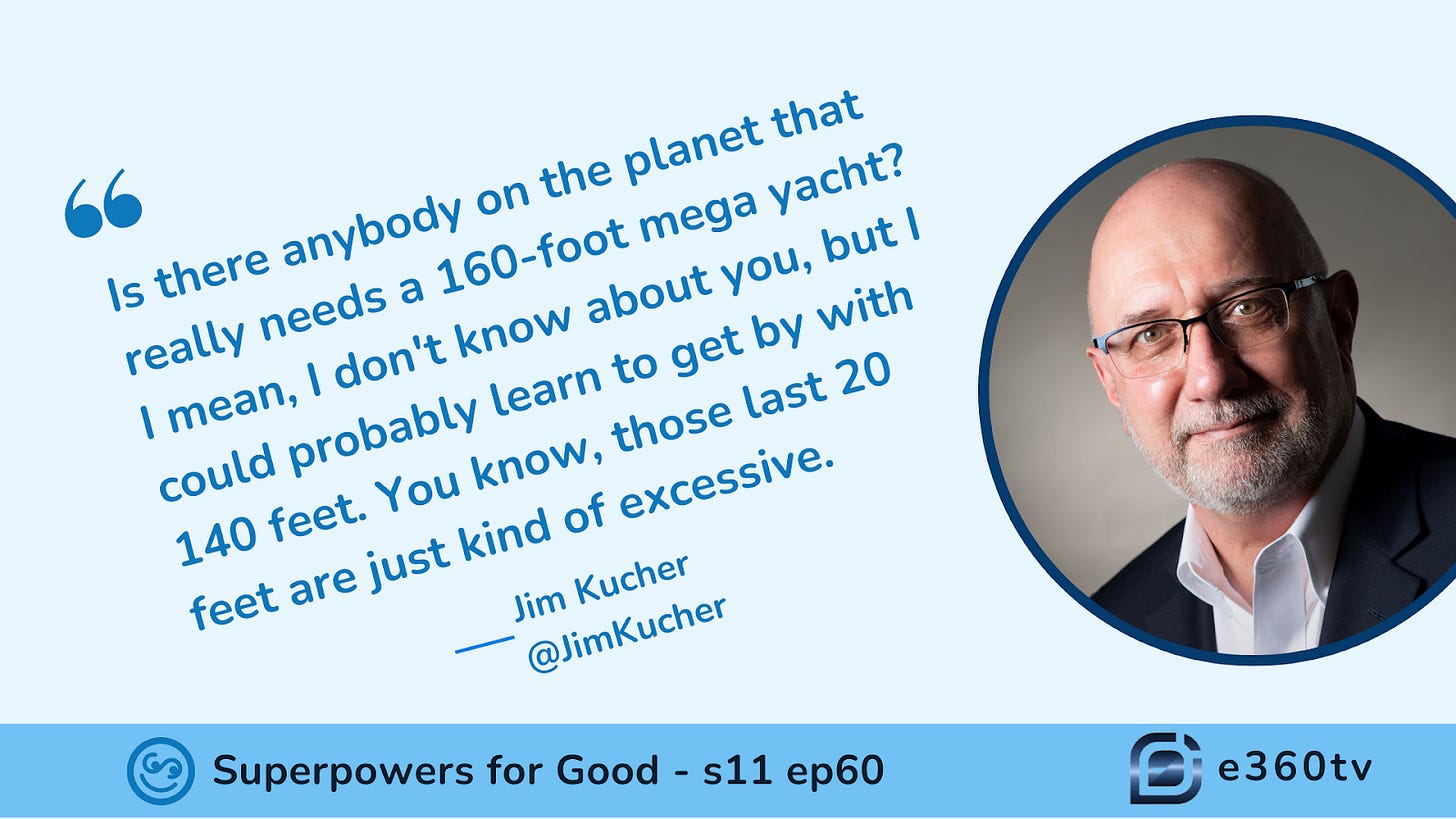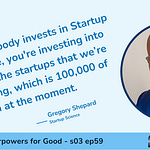I’m not a financial advisor; Superpowers for Good should not be considered investment advice. Seek appropriate counsel before making investment decisions.
Watch the show on television by downloading the e360tv channel app to your streaming device–Roku, AppleTV or AmazonFireTV. You can also see it on YouTube.
When you purchase an item, launch a crowdfunding campaign or invest after clicking a link here, we may earn a commission. It’s an easy way to support our work.
Devin: What do you see as your superpower?
Jim: The thing that I think I'm particularly good at and that I think other folks that do work like mine maybe aren't as good at is that I can identify the difference between a good idea and a good idea that actually works.
Living in Baltimore, one of the 19 US cities with over 100,000 in population and a Black majority, Jim Kucher, a professor at the University of Maryland, Baltimore, leads the social innovation certificate program. He sees the effects of historic and current systemic social injustices and how social enterprises are one way of addressing them.
Jim, who will speak at SuperCrowdBaltimore, cites Lawrence Brown from Morgan State University as the expert on the social disparities between white and Black communities in their city. A map showing neighborhoods in the town by racial composition shows an L-shaped area through the heart of the city that is predominantly white. The east and west sides of the city are primarily Black. Brown calls the areas the “White L” and the “Black Butterfly.”
“He has done a brilliant job of overlaying any number of social disparities, be they health, be they economic disparities, be they home ownership,” Jim says. “Every single one of them lays almost perfectly directly over those racial demographics.”
Brown is working on documenting the history of redlining in Baltimore, which evidence now shows to have been the origin of the practice enforced by the Federal government preventing banks from lending in predominantly Black neighborhoods. A literal red line defined no-lending communities.
Baltimore provides a textbook for defining social injustice. “Baltimore, because of that, is also a textbook for how this can be fixed,” Jim says.
Jim has identified four reasons why Baltimore is a great place for social entrepreneurs.
Higher than average percentage of people with graduate degrees.
Baltimore has substantial wealth “despite what people may think from the outside.”
The city is the optimal size for effective networking–big enough to have all the resources and small enough to access them.
The city is home to a variety of social problems, giving innovators plenty to work on.
Jim is excited to see people succeed and doesn’t begrudge anyone accumulating wealth, but does argue that enough can be enough:
I have a presentation that I've been using for years now around the basics of how to fix capitalism through social enterprise. There's a slide that I have in that presentation that talks about mega-yachts. I use a line that's intended as a bit of a joke but also very, very serious.
Is there anybody on the planet that really needs a 160-foot mega yacht? I mean, I don't know about you, but I could probably learn to get by with 140 feet. You know, those last 20 feet are just kind of excessive.
The program Jim directs at UMB is a graduate certificate in social entrepreneurship. It requires a bachelor’s degree to start the program but is only 12 credits rather than the 36 typical of master’s programs. You can complete the online program in one year.
“One of the reasons we did it that way is because a lot of the folks that are doing good work in social change already have various advanced degrees–master's in social work, sometimes an MBA–but they need specific skills around what's unique about social enterprise,” Jim says.
Throughout his career, Jim has leveraged and honed a superpower of opportunity discernment. He can distinguish between a good idea and one that will work as a business.
Jim and the folks at UMB have partnered with The Super Crowd, Inc., a public benefit corporation, to host SuperCrowdBaltimore on March 21st at the B&O Rail Museum. The program features a deep roster of both prominent local community builders and crowdfunding experts from across the country. The event allows everyone to learn how to be a social entrepreneur or an investor who supports them. Register now with the discount code SuperCrowd to save 30 percent.
AI Episode Summary
1. Devin Thorpe introduces his guest, Jim Kucher, from the University of Maryland, Baltimore, highlighting Jim's expertise in social impact and entrepreneurship.
2. Jim describes the graduate certificate in social entrepreneurship he directs at the university, explaining that it's a 12-credit, one-year, fully online program designed for individuals with advanced degrees who need specific skills unique to social enterprise.
3. The graduate certificate covers innovation in social settings, product/service development considering community needs, and marketing strategies for different stakeholders, including constituents, funders, and product/service buyers.
4. Jim emphasizes the importance of understanding how to finance social enterprises, teaching students to blend and time various financing strategies to create sustainable ventures.
5. Devin and Jim discuss the SuperCrowdBaltimore event, where Jim's program will be formally introduced, and the benefits of social entrepreneurship in addressing issues with capitalism, such as income inequality and when profit is excessive.
6. Jim credits a colleague, Lawrence Brown, for research on racial wealth gaps in Baltimore and explains the adverse effects of historical redlining practices on black communities.
7. Acknowledging the social and economic disparities in Baltimore, Jim notes that the city presents an ideal environment for social innovation due to its educated population, quiet wealth, manageable size for building networks, and range of social problems to address.
8. Jim's superpower is identifying the practicality of good ideas, knowing which ones can realistically work, and understanding when to walk away from unfeasible ones, using his experience with the impact of 9/11 on capital markets as an example.
9. He advises aspiring entrepreneurs to do simple arithmetic, like profit and loss statements and balance sheets and cautions that pursuing entrepreneurship based solely on a passion for an art or craft might lead one away from the actual passion itself.
10. Jim provides his email (jkucher@umaryland.edu) and directs the audience to the University of Maryland, Baltimore website for more information on the social entrepreneurship program, mentioning the SuperCrowdBaltimore event and other upcoming events for interested individuals.
How to Develop Opportunity Discernment As a Superpower
The power of opportunity discernment often manifests, Jim says, in what he chooses not to do rather than what to do.
One of the best things about performing that analysis is that you don't get pulled into something that can cause you harm.
We launched a technology company in the late 90s–I say we, my wife and I. The idea came out of my work in my MBA studies at the University of Baltimore. We licensed the federal technology. Everything was going quite well. We were getting some early investors.
And then somebody flew a plane into the side of a building in lower Manhattan. As you may recall, when 9/11 happened, all the capital markets dried up. Happily, we had the good sense to realize that that was a fatal blow to the business. We got out with our skin mostly intact.
The sort of mythical entrepreneur is this person that we think of with this incredible drive and this incredible push that can just sort of literally run through brick walls. I've tried to run through brick walls. The brick wall doesn't move. Your head hurts, but the brick wall doesn't move. Maybe you go around the brick wall; maybe you go over the brick wall; maybe you go under the brick wall. But maybe sometimes you say, “That wall is impenetrable. I'm going home.”
Jim says we can all improve this skill with “simple arithmetic.” Balance sheets and income statements can be created in spreadsheets, allowing anyone to understand the viability of a company. In real estate, folks ask, “Does it pencil?” That’s an excellent question for social enterprises, too.
By following Jim’s example and advice, you can develop your opportunity discernment. With practice, you can make it a superpower that enables you to do more good in the world.
Remember, however, that research into success suggests that building on your own superpowers is more important than creating new ones or overcoming weaknesses. You do you!
Guest Profile
Jim Kucher (he/him):
Associate Professor - Social Innovation, University of Maryland, Baltimore
About the University of Maryland, Baltimore: The Graduate School at The University of Maryland, Baltimore offers graduate education and training in biomedical, health, and human service sciences.
Website: graduate.umaryland.edu/innovation/
Biographical Information: Dr. J. Howard "Jim" Kucher is an Associate Professor of Social Innovation at the Graduate School of the University of Maryland, Baltimore. An award-winning teacher and internationally recognized thought leader in social entrepreneurship, he is the lead author of Social Entrepreneurship—A Practice-Based Approach to Social Innovation, recently published by Edward Elgar Publishers, a leading independent academic and professional publisher. In addition to his teaching duties, Kucher works as a consultant to leading and emerging social benefit initiatives to help them improve outcomes and increase sustainable revenues. He has successfully secured over $70m in working capital on behalf of mission-oriented enterprises and assisted over 100 area nonprofits and social enterprises in developing new models for meeting the needs of their constituents while increasing the sustainability of their organizations.
Kucher earned a Doctorate in Public Administration with a concentration in Social Entrepreneurship, as well as an MBA with an Entrepreneurship specialization from The University of Baltimore. He holds a B.A. from Kean University and has also earned certification as a project management professional and a new product development professional. He has been recognized as a Baltimore Renaissance Seed Scholar, an Unsung Hero of Small Business, and a Fulbright Specialist Scholar in Social Entrepreneurship.
His current research explores the field of Economic Theology and its practical application in faith-based social enterprise.
X/Twitter Handle: @jimkucher
Linkedin: linkedin.com/in/jimkucher/
Upcoming SuperCrowd Event Calendar
If a location is not noted, the events below are virtual.
SuperCrowdBaltimore, March 21, 2024: This in-person event at the B&O Rail Museum features some of Baltimore’s prominent citizens and community leaders. Save 30 percent with the discount code “SuperCrowd.”
Impact Cherub Club Meeting hosted by The Super Crowd, Inc., a public benefit corporation, on March 26, 2024, at 1:00 PM Eastern. Each month, the Club meets to review new offerings for investment consideration and to conduct due diligence on previously screened deals. Everyone is welcome to join the free events.
SuperCrowdHour, March 27, 2024 at 1:00 Eastern. Devin Thorpe will explain the three surprising reasons impact investors should seek to make money from impact investing.
Superpowers for Good - Kinect Capital Live Pitch, March 28 at 9 PM Eastern/6 PM Pacific: Four companies currently raising via crowdfunding will pitch their offerings live via the Superpowers for Good streaming television show on e360tv. Kinect Capital will host the pitch. Applications to pitch are open now through March 8!
SuperCrowd24, April 17-18: This two-day virtual event is our biggest event of the year. Don’t miss it. Save 50 percent with the discount code “SuperCrowd.”
SuperCrowdChicago, June 12, 2024. Save the date! More information is coming soon!
Recently, we created an AI GPT to help you learn more about The Super Crowd, Inc., a public benefit corporation, and our upcoming events. Click here to try it.
SuperCrowd Community Event Calendar
Digital Peacebuilding Expo, March 13, 12-5 PM, Washington, DC, hybrid
Crowdfunding Professional Association Webinar Series - March 13, 2:00 PM ET
Investment Crowdfunding Demystified, Crowdfund Better, March 26 at 2:00 PM ET
Move Your Money Month, April 2024, American Independent Business Alliance
If you would like to submit an event for us to share with the 4,000+ members of the SuperCrowd, click here.

















